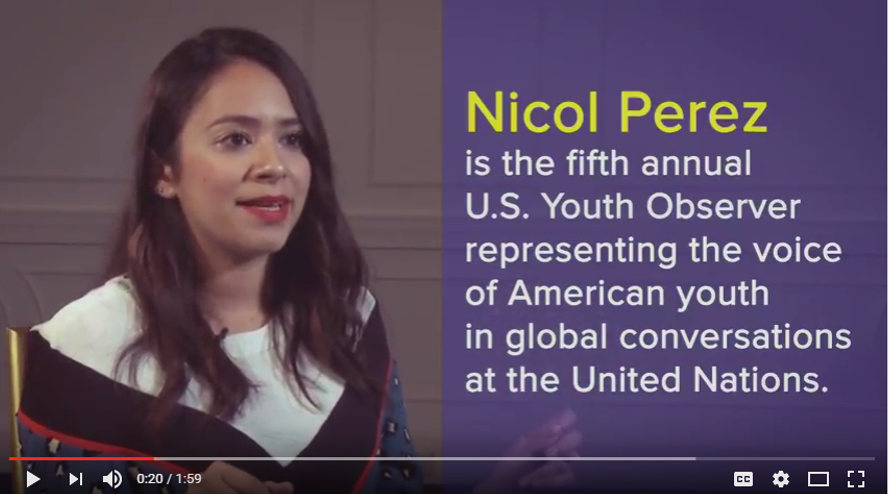Sharing Youth Perspectives on the Global #RefugeeCrisis with One of America’s Top Diplomats

Across the street from the UN headquarters in mid-town Manhattan, I walked into the U.S. Mission to the UN and stood on perfectly polished floors while staring at portraits of President Barack Obama, Secretary of State John Kerry, and U.S. Ambassador Samantha Power—the faces of the United States to the world. For a second I almost couldn’t believe I had the rare opportunity to meet with our Ambassador to the United Nations.
Also a member of President Obama’s Cabinet, Ambassador Power works to advance U.S. interests, promote and defend universal values, and address pressing global challenges to global peace, security, and prosperity at the United Nations. She also represents the United States on the UN Security Council and during almost all plenary meetings of the General Assembly.
Ambassador Power is impressive. She has a direct, no nonsense demeanor and an incredible laser focus. She began the meeting by asking me what I planned to accomplish in my new role as Youth Observer. I laid out my ideas to help young Americans, specifically, my plan to continue to collect the voices of young people through the US Youth Voices survey and my desire to encourage the active participation of the private sector with the Sustainable Development Goals. Finally, I described my desire to increase youth awareness and empathy about the global refugee crisis. This crisis is also at the top of her list and has been a main focus at the United Nations.
While in New York, I also met with 25 other youth delegates from around the world. Ahmad Alhendawi, the UN Youth Envoy, and I led a discussion on the role young people play in ameliorating the refugee crisis. While we broached the root causes of this crisis, we collectively recognized the urgent need for swift action to resettle displaced peoples.
There are currently 65 million people that have been forcibly displaced from their homes. Roughly 51 percent are children. Ahmed’s remarks really hit home for all of us. If we don’t act now, this could be the biggest disappointment in our generation, and even the last century.
Many countries have resisted welcoming refugees, including a vibrant debate here in the United States. Ultimately, President Obama called for the admission of 84,995 refugees from 79 countries, including more than 12,500 from Syria alone. But, why is it that so many countries, specifically wealthy countries, are closing their borders to people that are running from harm? Well, two of the main concerns are security and the economy.
These are valid concerns; however, we must tackle them by looking at the facts. Before coming to the United States, refugees are first screened by the United Nations Refugee Agency. Then, they are screened against various databases including the National Counterterrorism Center, the FBI, the Department of Defense, and the Department of Homeland Security. The screening process on average takes 18 to 24 months to complete. This process has proven effective. Of the 820,000 refugees that have been accepted into the United States since September 11, 2001, only a tiny fraction of one percent of admitted refugees have been arrested or removed from the United States due to terrorism concerns. Thus, our government continues to work diligently to make sure that the American people are kept safe, while also playing our part in helping those that are most in need.
A number of states have also said they will close their borders to refugees here in the U.S. for economic reasons. Many Americans fear that the costs of resettling refugees will deplete state resources. Others fear that refugees will take jobs away from native born Americans.
Let’s look at the facts: While resettling refugees does require upfront investments, new refugees are provided a one-time total of $2,075 to cover housing, food and other expenses. Consider how much support that is for refugees that have no support system, no job, they don’t know the language, and have no resources. While the assistance we give refugees is low, studies have found that refugees have a positive impact in the communities in which they are resettled. Just consider some of the people that were once refugees: Madeline Albright, Henry Kissinger, and Albert Einstein.
Ultimately, we need to build empathy in our communities and there is no one that is more suited to tackle this problem than young people. We have social media to help us share the facts and we use visual storytelling to inform and inspire others on the issues we’re passionate about.
President Obama has determined that the United States will admit 110,000 refugees to be resettled in the United States next year. Be a part of a welcoming committee to make refugees feel at home. See here for more information: www.state.gov/refugeeresponse or www.aidrefugees.gov.
Toward the end of my meeting with Ambassador Power, she told me about the commitments that have been made by the private sector to help refugees around the world. It is inspiring to see so many different players coming together to help those that are most vulnerable. As I walked out of the meeting, I felt energized with a new sense of urgency. We must act now. We all have a role to play.
I’d love to know how you are getting involved with this issue. Whether you work for a company that is contributing to solutions or are helping in another way, I want to hear from you! Direct message me on Facebook (www.facebook.com/usyouthobserver) or Instagram (@usyouthobserver) with the projects you’re working on!




